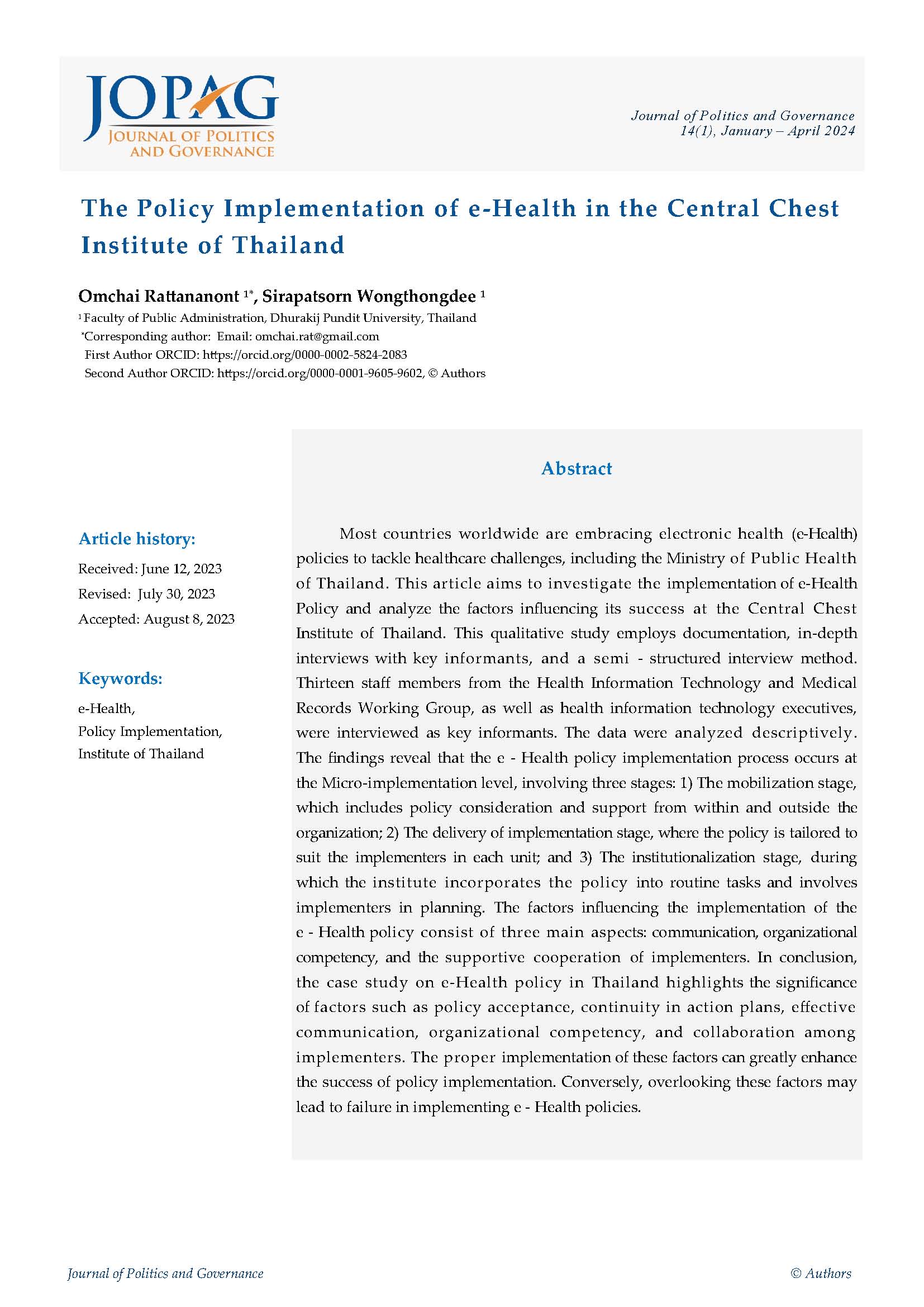The Policy Implementation of e-Health in the Central Chest Institute of Thailand
Main Article Content
Abstract
Most countries worldwide are embracing electronic health (e-Health) policies to tackle healthcare challenges, including the Ministry of Public Health of Thailand. This article aims to investigate the implementation of e-Health Policy and analyze the factors influencing its success at the Central Chest Institute of Thailand. This qualitative study employs documentation, in-depth interviews with key informants, and a semi - structured interview method. Thirteen staff members from the Health Information Technology and Medical Records Working Group, as well as health information technology executives, were interviewed as key informants. The data were analyzed descriptively. The findings reveal that the e - Health policy implementation process occurs at the Micro-implementation level, involving three stages: 1) The mobilization stage, which includes policy consideration and support from within and outside the organization; 2) The delivery of implementation stage, where the policy is tailored to suit the implementers in each unit; and 3) The institutionalization stage, during which the institute incorporates the policy into routine tasks and involves implementers in planning. The factors influencing the implementation of the e - Health policy consist of three main aspects: communication, organizational competency, and the supportive cooperation of implementers. In conclusion, the case study on e-Health policy in Thailand highlights the significance of factors such as policy acceptance, continuity in action plans, effective communication, organizational competency, and collaboration among implementers. The proper implementation of these factors can greatly enhance the success of policy implementation. Conversely, overlooking these factors may lead to failure in implementing e - Health policies.
Article Details

This work is licensed under a Creative Commons Attribution-NonCommercial-NoDerivatives 4.0 International License.
References
Alanezi, F. (2020). Factors affecting the adoption of e-health system in the Kingdom of Saudi Arabia. International Health, 13(1), 456–470. http://doi.org/10.1093/inthealth/ihaa091
Alexander, E.R. (1985). Form Idea to Action: Notes for a Contingency Theory of Policy Implementation Process. Administration and Society, 16(4), 403- 426.
Archer, N., Lokker, C., Ghasemaghaei, M., & DiLiberto, D. (2021). eHealth Implementation Issues in Low-Resource Countries: Model, Survey, and Analysis of User Experience. Journal of Medical Internet Research, 23(6), e23715. https://doi.org /10.2196/23715
Chandarasorn, V. (2000). Policy implementation (4th ed.). Sahy Block & Karnpim LTD.
Chandarasorn, V. (2008). Theory of Public Policy Implementation (2nd ed). Prigwhan Graphic.
Cheema, G., Shabbir and Dennis, A., & Rondinelli. (1983). Decentralization and Development: Policy Implementation in Developing Countries. Sage Publications.
Chumnual, N. (2010). Factors Affecting the Implementation of Educational Information Technology Policy: A Case Study of Krabi Educational Service Area Office. [Master’s thesis, Srinakharinwirot University]. http://ir.swu.ac.th/xmlui /bitstream/handle/ 123456789/1161/ Nantaporn_C.pdf?sequence =1&isAllowed=y
Digitality for Economy and Society Act 2017. (2017,24 January). Government Gazette, 134, Part 10a. P.1
Edwards III, G. C. (1980). Implementing Public Policy. Congressional Quarterly Press.
Granja, C., Janssen, W., & Johansen, M. A. (2018). Factors Determining the Success and Failure of eHealth Interventions: Systematic Review of the Literature. Journal of Medical Internet Research, 20(5), e10235. https://doi.org /10.2196/10235
Kesse-Tachi, A., Asmah, A. E., & Agbozo, E. (2019). Factors influencing adoption of eHealth technologies in Ghana. Digital Health, 5(1), 1–13. https://doi.org/10.1177/ 2055207619871425
Kummak, O. (2011). Factor affecting the success of implementation of administration and education of decentralization policy on basic education school under the office of basic education commission, inspection region 6th, Ministry of education. [Master’s thesis, Silpakorn University]. http://sure. su.ac.th/xmlui/bitstream/ndle/123456789/ 10474/full text.pdf?sequence=2&isAllowed=y
Obstfelder, A., Engeseth, K. H., & Wynn, R. (2007). Characteristics of successfully implemented Telemedical applications. Implementation Science, 2(25). https://doi.org/10.1186/1748-5908-2-25
Pilun, K. (2006). The Policy Implementation of Sangha University: a case study Of Mahachulalongkornrajavidyalaya University. [Master’s thesis, Srinakharinwirot University]. http://thesis.swu.ac.th/swuthesis/Pub_Pol/Kanong_P.pdf
Ruanggoon, J. (2013). Organizational Change: Concepts, Process, and the Roles of Human resources professional. Panyapiwat Journal, 5(1), 194-203.
Termme, P. (2016). The Factor within the Enterprise to Successful Implementation of the Government Savings Bank’s Policy of Retail Banking for Professionals in Nakornpathom. Integrated Social Science Journal, 3(2), 74-92.
Tongchompoo, T. (2015). Factor that affect the successful implementation the policy of transparency promotes moral and ethic of Land Development Department. [Master’s thesis, Mahidol University]. https://dric.nrct.go.th/Search/Search Detail/293345
Tongkow, K. (1991). The Analysis of factor affecting the Success of public policy implementation: A case study of the National Literacy Campaign. [Doctoral Dissertation, National Institute of Development Administration]. https://repository.nida.ac.th/handle/ 662723737/911
Van Meter, D. S., & Van Horn, C. E. (1975). The policy implementation process: A conceptual framework. Administration & Society, 6(4), 445-448.
Witoolkollachit, P. (2017). eHealth Strategy, Ministry of Public Health (2017– 2026). https://ict.moph.go. th/upload file/files/e-health Strategy_THAI_16 NOV17.pdf
Yavapraphas, S. (2009). Public Policy (8th ed.). Chulalongkorn University Press.


